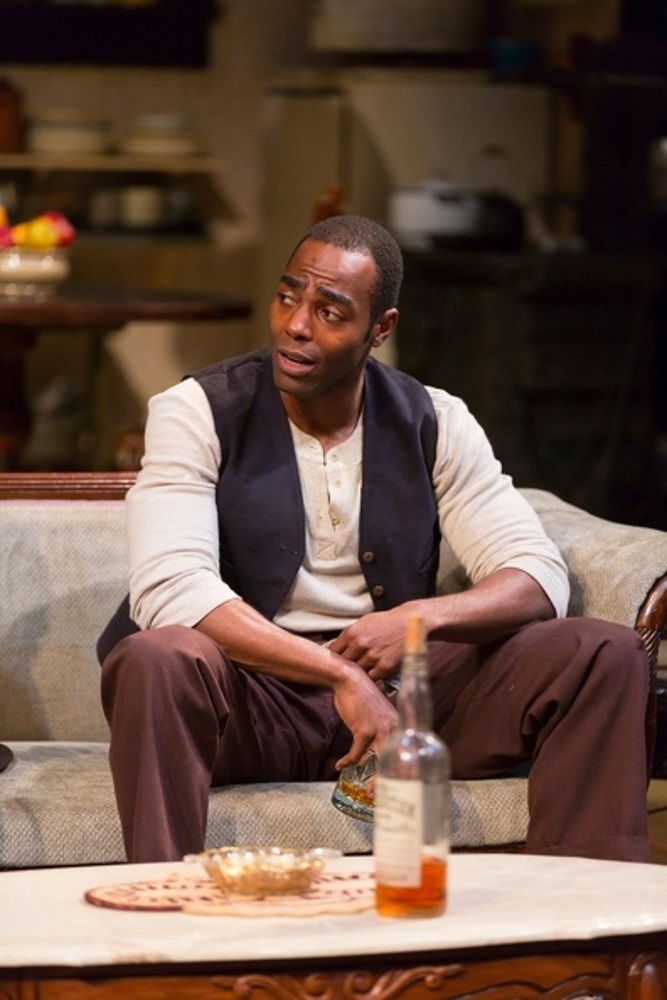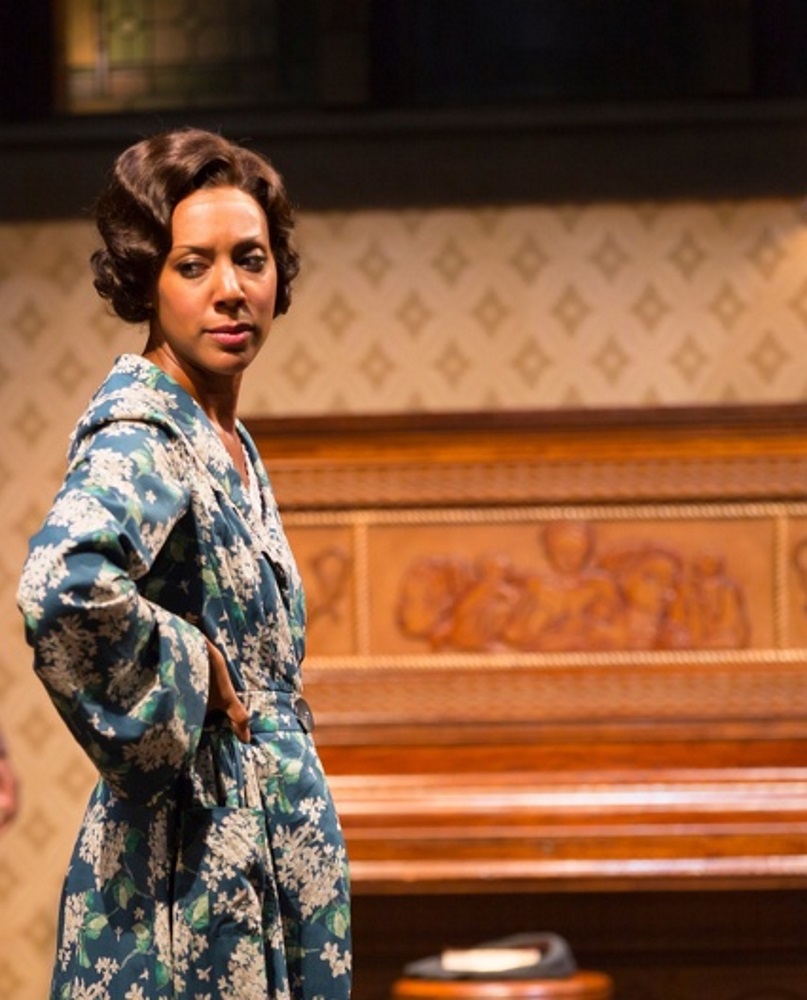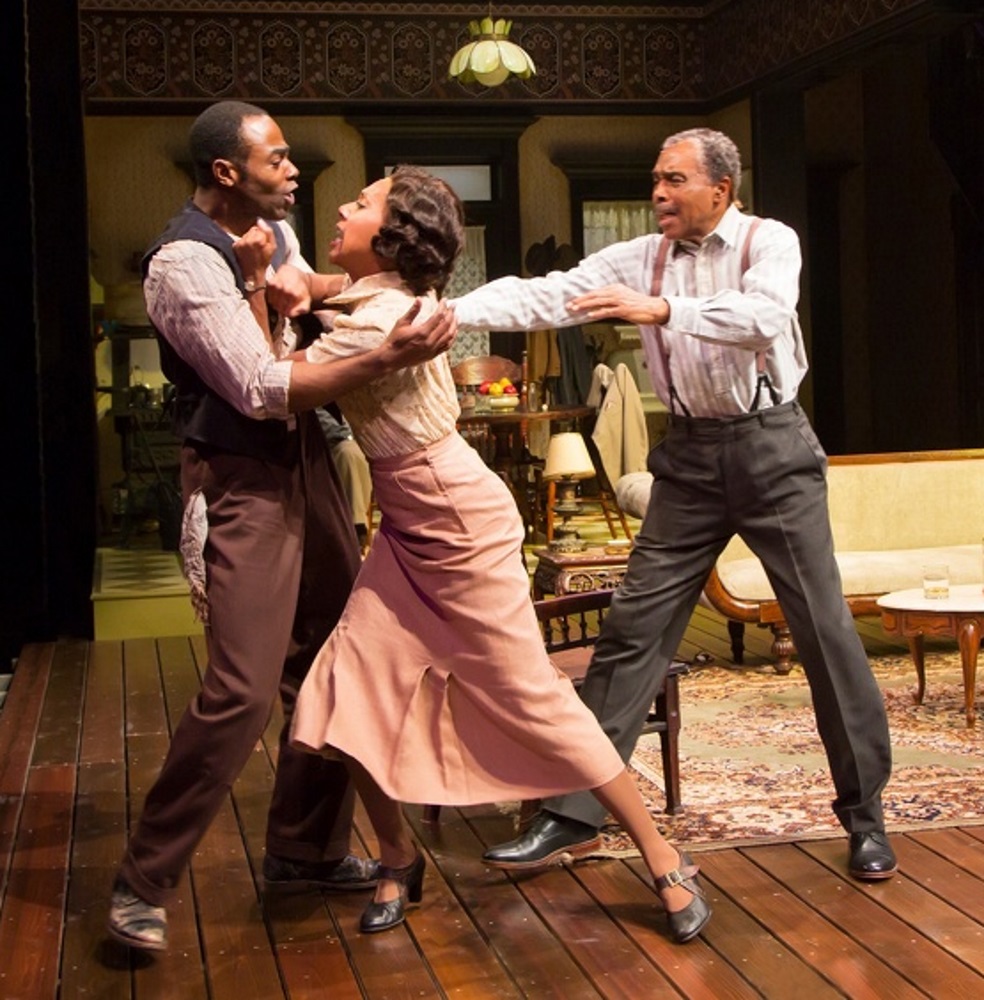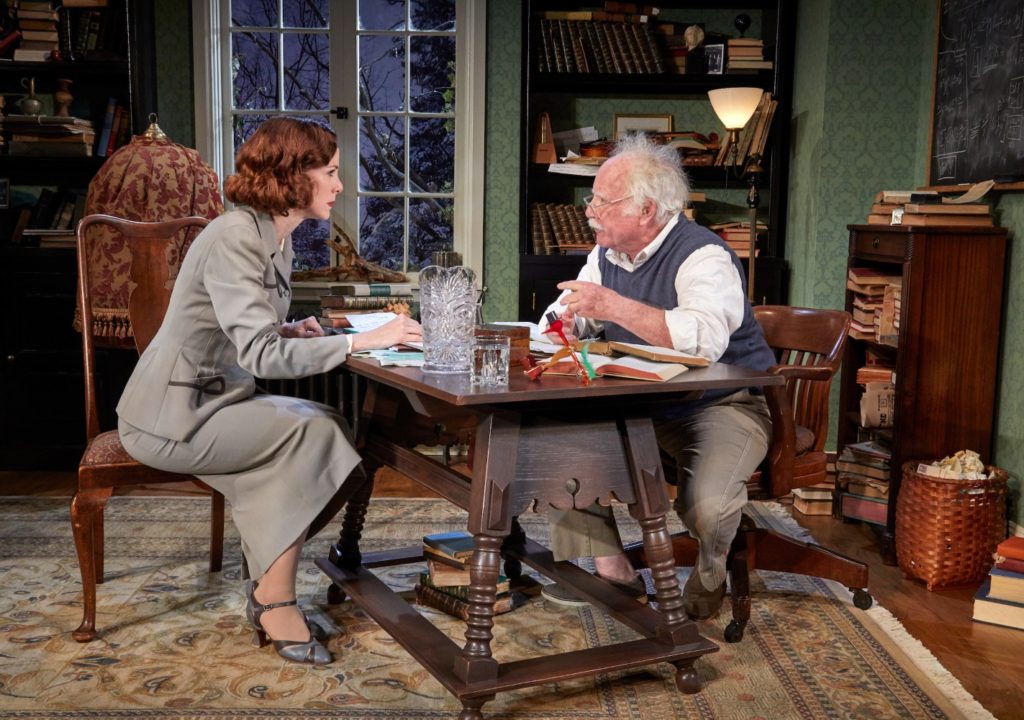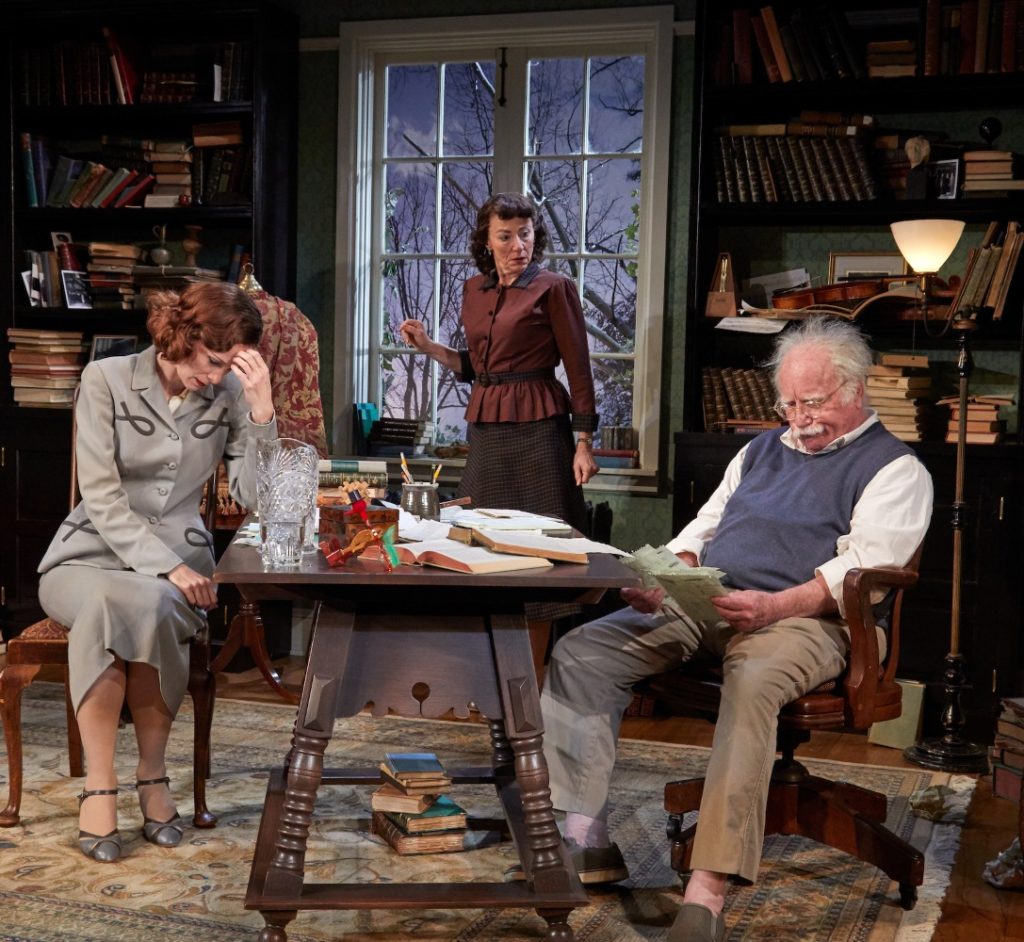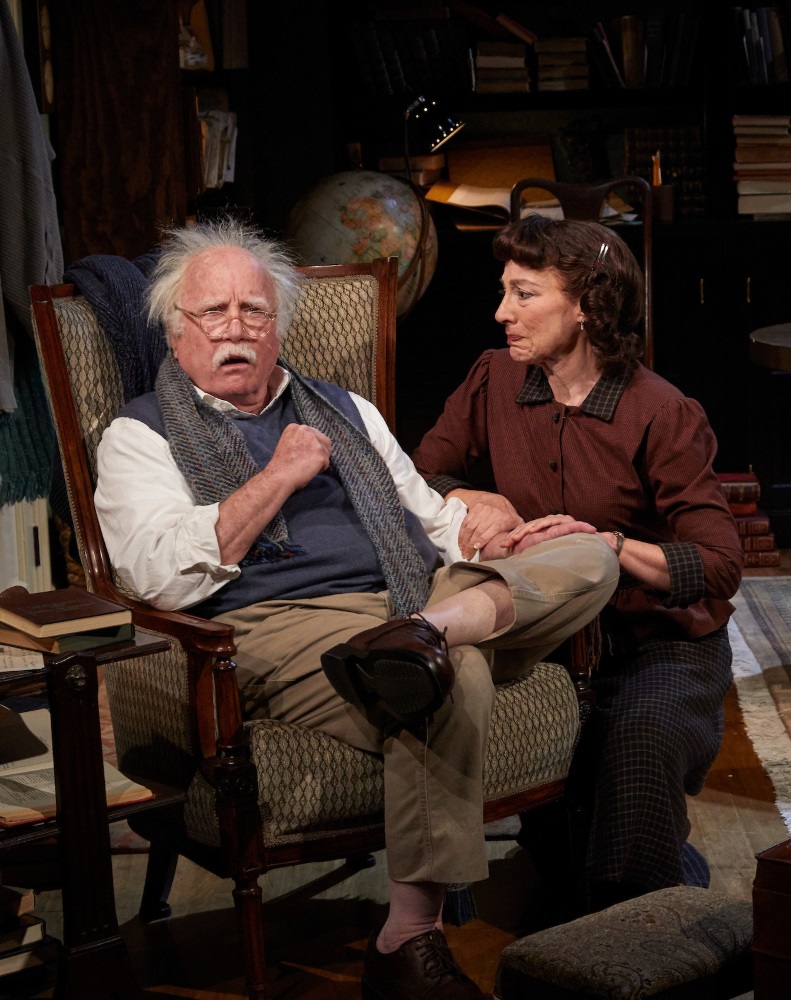Neither of the shows now playing in downtown Hartford are Halloween-themed, but both are thoroughly haunted by ghosts of the past, in one case literally.
That one is The Piano Lesson, at Hartford Stage through November 13. It’s the 1930s segment of August Wilson’s decade-by-decade cycle of plays touching on African-Americans’ experience through the 20th century. In a program note, dramaturg Fiona Kyle locates the play as Wilson’s response to the Great Migration of Southern black pe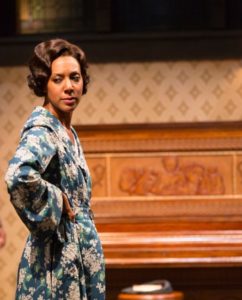 ople to Northern cities to seek economic opportunity and escape Jim Crow. Like most of the series, the play takes place in Wilson’s birthplace, the Hill District of Pittsburg, a densely black neighborhood where rambling old houses rubbed shoulders with tenements. (Alexis Distler’s set, warmly lit by York Kennedy, effectively contrasts the two.)
ople to Northern cities to seek economic opportunity and escape Jim Crow. Like most of the series, the play takes place in Wilson’s birthplace, the Hill District of Pittsburg, a densely black neighborhood where rambling old houses rubbed shoulders with tenements. (Alexis Distler’s set, warmly lit by York Kennedy, effectively contrasts the two.)
The Charles family’s house is one of those gracious antiques. In it, pride of place goes to an upright piano decorated with handmade carvings depicting the family’s history back to slavery days. That heirloom is the play’s point of conflict, waged between Berniece, for whom it’s a precious generational legacy, and her brother, Boy Willie, who wants t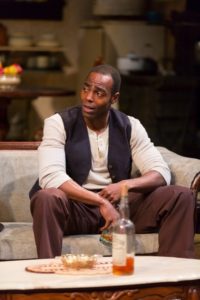 o sell it.
o sell it.
There’s a complex back story from “down home” involving old legends, a couple of deaths, and vengeful spirits, one of which has started appearing in the house. The battle over the piano between ambitious, fast-talking Boy Willie and tense, resentful Berniece (she blames her brother for her husband’s recent death) epitomizes migrants’ age-old tug-of-war between the cherished, irretrievable past and the tempting but perilous present and future.
Jade King Carroll’s production is riveting and illuminating. Running almost three hours, it occasionally sags during some of the script’s detours and redundancies. but generally maintains a headlong momentum carried by the play’s thick tapestry of family memories, jokes and squabbles, enacted by a brilliant ensemble.
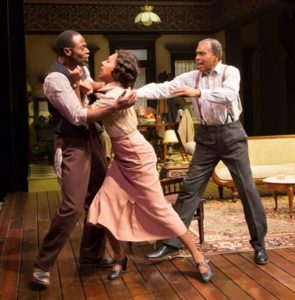 Clifton Duncan’s locomotive energy as Boy Willie drives the play, with everyone else in his slipstream. You can almost see Christina Acosta Robinson’s Berniece fighting the headwind as she stubbornly resists Boy Willie, protects her 11-year-old daughter (Elise Taylor) and deflects the respectful but persistent courtship of a storefront preacher (Daniel Morgan Shelley).
Clifton Duncan’s locomotive energy as Boy Willie drives the play, with everyone else in his slipstream. You can almost see Christina Acosta Robinson’s Berniece fighting the headwind as she stubbornly resists Boy Willie, protects her 11-year-old daughter (Elise Taylor) and deflects the respectful but persistent courtship of a storefront preacher (Daniel Morgan Shelley).
Galen Ryan Kane is Boy Willie’s laconic friend Lymon, dazzled by the big city’s promise and its women – one of whom is Grace (Toccarra Cash), who consecutively dazzles both the young men. The older generation is embodied by Roscoe Orman as Doaker, the crusty retiree who owns the house and ineffectually referees the quarrels, and Cleavant Derricks as Wining Boy, the tipsy family friend who talks rich but is pawning his wardrobe.
Relative Formulas
What-if’s are potent springboards for drama, especially when they’re tied to famous personalities. We seem to be irresistibly drawn to the dark corners of public lives, especially when they reveal our icons as less than perfect, or worse.
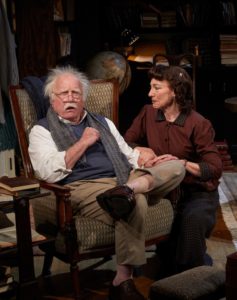 Relativity, the new play by Mark St. Germain playing at TheaterWorks through November 20, peers into one such corner to unearth a ghost from the all-but-forgotten past of Albert Einstein. In 1902, before he and his first wife were married, they had a daughter who died in infancy. Or did she? The existence of baby Lieserl only came to light in 1986, three decades after Einstein’s death, and the play springs from speculation that instead of dying she was given up for adoption and grew to adulthood.
Relativity, the new play by Mark St. Germain playing at TheaterWorks through November 20, peers into one such corner to unearth a ghost from the all-but-forgotten past of Albert Einstein. In 1902, before he and his first wife were married, they had a daughter who died in infancy. Or did she? The existence of baby Lieserl only came to light in 1986, three decades after Einstein’s death, and the play springs from speculation that instead of dying she was given up for adoption and grew to adulthood.
The playwright imagines a confrontation in 1948 in Einstein’s Princeton study, where the messy piles of books and papers in Brian Prather’s set contrast with Philip S. Rosenberg’s stark winter sunlight outside the window. The daughter, now named Margaret (and for some reason I didn’t catch, brought up in America, not Europe), gains access to the great man by posing as a journalist seeking an interview. 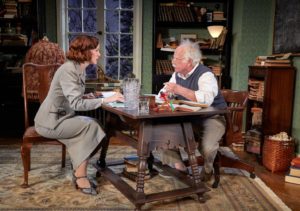 After a few preliminary questions establish that virtually all of Einstein’s surviving relatives despise him, she reveals herself as his long-lost daughter and sets about overriding his strenuous denials.
After a few preliminary questions establish that virtually all of Einstein’s surviving relatives despise him, she reveals herself as his long-lost daughter and sets about overriding his strenuous denials.
While the premise is intriguing enough, the run at TheaterWorks is all but sold out, and recently extended, due primarily to the pull of its movie-star lead, Richard Dreyfuss. Here, Einstein is not the endearing, eccentric genius and anti-war humanist we like to remember, but the irascible misanthrope who said, “I love humanity but I hate humans,” and who – in this play, anyway – refers to his family as “tar beneath my feet” who distracted from his work, and argues that “utility trumps morality,” even when his soon-to-be-world-shaking researches trumped an inconvenient baby daughter.
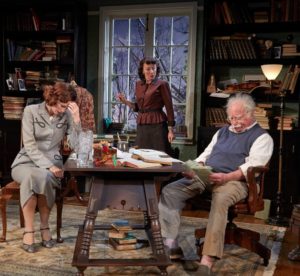 Dreyfuss’s performance is marvelous – mercurial, ironic, with flashes of humor and charm that leaven his defensive rage. It’s a complex portrait that’s both captivating and troubling. Unfortunately, the playwright is far more interested in his famous subject than the two women in the cast, and Rob Ruggiero’s deft direction only partially overcomes that weakness. The role of Margaret is little more than a plot trigger and foil for its target, and Christa Scott-Reed struggles to make her real or appealing. Lori Wilner plays Helen Dukas, Einstein’s real-life secretary and, here, fierce gatekeeper – a starchy martinet who’s played mostly for comic relief.
Dreyfuss’s performance is marvelous – mercurial, ironic, with flashes of humor and charm that leaven his defensive rage. It’s a complex portrait that’s both captivating and troubling. Unfortunately, the playwright is far more interested in his famous subject than the two women in the cast, and Rob Ruggiero’s deft direction only partially overcomes that weakness. The role of Margaret is little more than a plot trigger and foil for its target, and Christa Scott-Reed struggles to make her real or appealing. Lori Wilner plays Helen Dukas, Einstein’s real-life secretary and, here, fierce gatekeeper – a starchy martinet who’s played mostly for comic relief.
The title’s double, even triple meaning reverberates throughout the play, referencing not only Einstein’s famous theory but his startling family connection, as well as the question of relative balance within the paradox posed by that discovery: Does a great man’s greatness require that he also be a good man?
The Piano Lesson photos by T. Charles Erickson
Relativity photos by Lanny Nagler
If you’d like to be notified of future posts, email StageStruck@crocker.com

